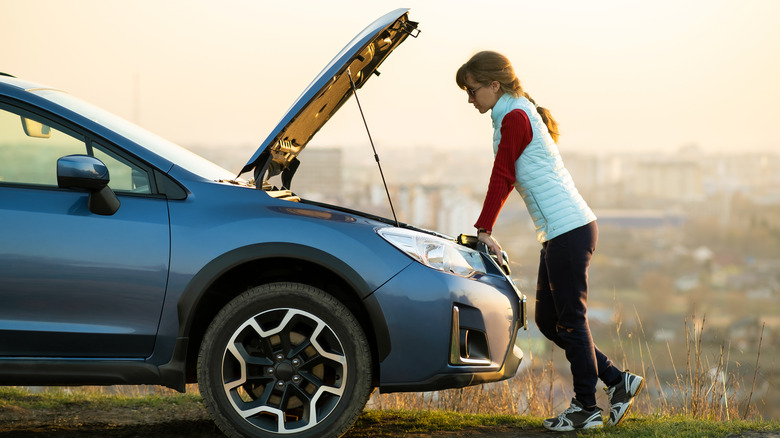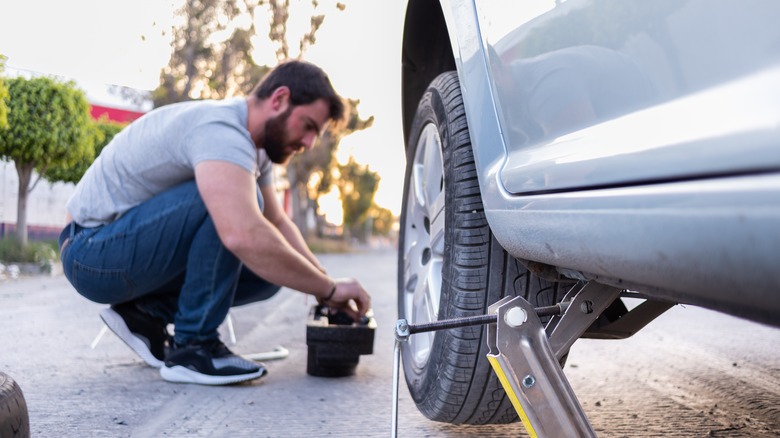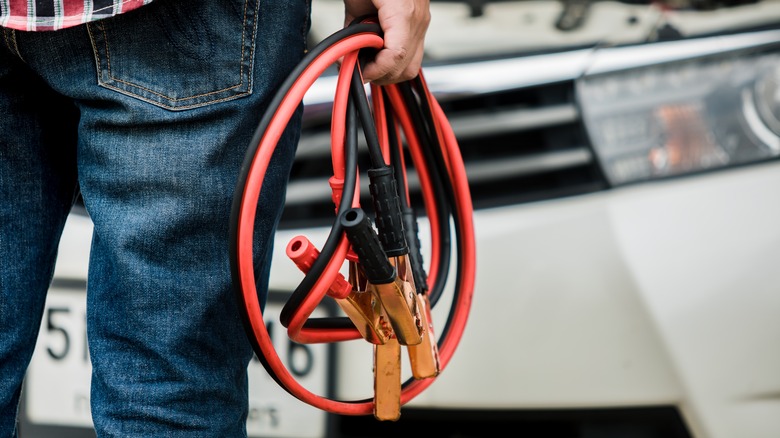Every Road Trip Car Breakdown Kit Should Include These Tools, According To Our Travel Expert
There's nothing like taking an epic road trip. It's undeniably a perfect way to travel, especially if you're exploring large countries like the United States. Unfortunately, traveling by car comes with all sorts of problems. Many of the best road trips take you to remote, off-the-beaten-path destinations where you can experience the natural beauty and rugged landscapes, but it also means you'll be far away from any mechanic should something go wrong with your car.
According to data gathered by Agero, more than 69 million cars break down in the United States each year, and an AAA report shows that if your car is over 10 years old, you run an even higher risk of car trouble. Nothing ruins an unforgettable road trip vacation like being stranded on the side of the highway for hours while you wait for a tow truck. Even the most seasoned road tripper can face problems if unprepared. With some preparation and planning, you can avoid getting stranded roadside by packing a car breakdown kit.
Nate Murphy, author of the best-selling Van Conversion Guide and founder of DIYhero, a van conversion course, has spent years of his life on extended road trips. In an exclusive interview with Explore, Nate told us everything he recommends, including packing a road trip breakdown kit to get back on the road faster when you run into unfortunate car trouble.
Perform some basic vehicle checks before you begin building your tool kit
Before you begin building your road trip breakdown kit, having your car checked out is a good idea. Going to the mechanic for a trip check is much like going to the doctor for a check-up but on your vehicle. You don't want to wait until something goes wrong to have things checked out. Nate Murphy suggests taking your car to a trusted mechanic before your trip to ensure nothing major is wrong and to help you feel safer on a long-haul road trip. "If your vehicle is due for a service or has been showing signs of trouble, it's a good idea to address these issues before hitting the road. No one wants to spend half their road trip waiting for a vehicle to get fixed," Nate told Explore.
Even if your car seems okay, Nate recommends doing some basic checks. "This includes checking the oil, coolant, brake fluid, transmission fluid, and windshield washer fluid levels. Additionally, check the condition of the brakes, tires, and lights" he told us. Before you begin purchasing items for your kit, read over your owner's manual because tools can depend on the make, model, and year of your car.
Plan your route ahead of time so that you can be prepared for all types of conditions
Nate Murphy has ventured all over on road trips, so he knows what to expect in almost any situation. If you're new to road-tripping or visiting an area for the first time, he suggests doing some research ahead of time so you know what to expect. "Properly consider the weather and road conditions you may face on your trip. If you are traveling through mountainous terrain, or other places where it may snow, be sure to pack snow chains or socks — or appropriate tires," Nate told Explore.
You should also check that you know how to use everything you bring for your vehicle. Ensure you know how to apply the chains before you leave because "no one wants to be figuring that out in the freezing cold!" he reminded us. Knowing the weather, terrain, and potentially hazardous conditions along your road trip route will ensure you pack everything you need and can make road trips so much easier.
Take care of your tires
Once you're well aware of the condition of your vehicle and the conditions on your road trip route, it's time to start packing the perfect road trip breakdown kit. During his many adventures, Nate discovered that self-sufficiency is vital when traveling. He recommends packing some essential tools to be well-prepared and ensure your trip is stress-free. First, he suggests purchasing a tire foam or tire repair kit to help repair them quickly. "If far away from services, this cheap and lightweight item can be a lifesaver. It is worth checking out how to use them before you go, just in case you do not have data," he told us.
In addition to the tire repair kit, ensure you have a tire pump for when you have a slow leak and need to add air to balance your tire pressure. Some varieties run off your car's battery, and manual pumps are also on the market. Most cars have a spare tire in the back, so pack a four-way lug wrench if you need to change one during your trip. "I would recommend that you learn how to access the spare tire before you go, on some vehicles this is a little more complicated than you may realize," Nate told us.
Prepare for battery problems
Chances are, there's probably been a time in your life when you've returned to your vehicle only to find that the engine won't start. Perhaps you were so excited to hit the trails that you unknowingly left your headlights on or something plugged into the vehicle that slowly drained your battery. We've all been there!
According to Nate, "A dead battery, especially in colder weather, is not uncommon." He's right — it's one of the most common car problems. And since batteries are one of the most critical aspects of our car's electrical systems, the vehicle will not turn on without a jump start. Keeping jumper cables in your car is always a good idea, especially on a road trip. Nate recommends keeping cables at least 16 feet in our road trip breakdown kit so that a kind passerby can jump you in a pinch. It will also ensure you're empowered to help other, less prepared road trippers should you run into someone who needs a battery jump during your travels.
"Again, spend 20 minutes to familiarize yourself with how to properly jumpstart an engine," Nate told us. If you're traveling to a super remote area, consider a 12-volt battery-operated jump starter that allows you to give your car battery the boost it needs without the help of another vehicle. Prices for the portable jump starters start at about $50.
Other essential items to keep in your road trip car breakdown kit
Nate recommends packing a socket wrench set before you head out. Socket wrenches are handy for all repairs, especially if you're familiar with a car engine. "If you know nothing about engines, this might not be so useful — but if you have a bit of an idea, you can fix something before you get to a mechanic," he told Explore.
Bring a flashlight for car problems at night so you can see what you're working on. A reflective triangle is also helpful for safety during late-night road trips. Duct tape can be beneficial for temporary fixes, and a multi-tool is suitable for all sorts of repairs. Pack a physical map in case your phone unexpectedly dies, or you don't have enough signal to use GPS.
"Lastly, check that you have appropriate breakdown assistance and insurance," Nate told Explore. "A roadside assistance plan can save you thousands if you break down somewhere remote or need a tow." You should call your insurance before you depart and ensure you're covered for your trip, especially if traveling internationally. Adjusting your policy to ensure that you're covered is a good idea. Once you've created your perfect car breakdown kit, it's important that you periodically check that everything is in working order. Some items, like tire repair kits, may expire, so ensure your equipment is up to date before each road trip.





